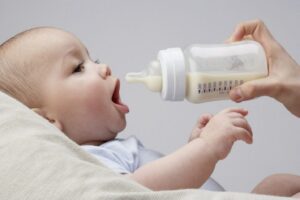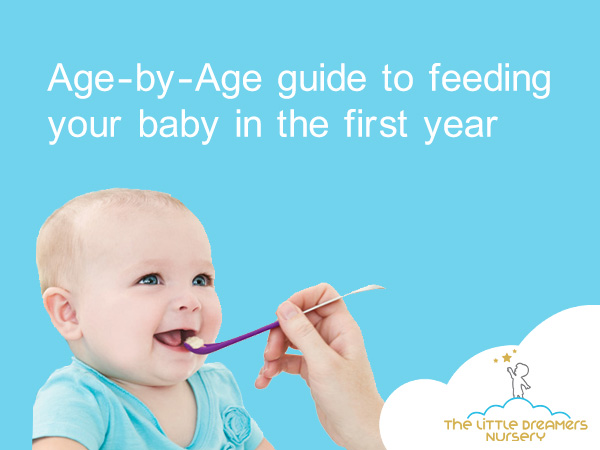There is no other time in your child’s life when they will grow as much as they do in their first year. Remember that feeding your baby a variety of nutritious foods at the right time is essential. The first year of your baby’s life is critical for establishing healthy eating habits as one of good habits for children. Developing healthy eating habits as a child will set the pace for a lifetime of good eating habits.
Using this guide, you can find out what and how much to feed your baby in the first year. Don’t worry about feeding your baby in the first year a little less or more than the recommended amounts. As a British Nursery in Dubai, we suggest that parents talk to their child’s doctor about starting solids before they begin. Now let’s see what babies can eat in the first year.
All you need to know about feeding your baby
Age Range: from Birth to Four Months Old

Feeding Behavior
- A “rooting reflex” assists your baby in finding food.
What should I feed the baby?
- Formula or breast milk only
Before feeding your baby, consider the following:
- It’s still too early for your baby’s digestive system to handle solid food. So feeding your baby with these types of foods is not advisable.
Age Range: Four-to-Six Months Old
When can we start solid foods for babies?
The following are signs that you can start feeding your baby with solid foods:
- They can keep their head up and sit upright in a high chair.
- Weigh at least 13 pounds and a significant weight gain (doubling of birth weight) is evident in this baby.
- They can completely seal their lips around a spoon
- Ability to reposition food in the mouth

What should I feed the baby?
- Breast milk or formula, or any other supplement
- Chopped and pureed veggies (peas, squash)
- Fruit pureed to smooth consistency (apples, bananas, peaches)
- Meat in a pureed form (chicken, pork, beef)
- Cereal that is both semi-liquid and fortified with iron (avoid rice cereal; instead choose a cereal made with oats or barley)
- Unsweetened yogurt (no cow’s milk until age 1) in small amounts
How much on a daily basis?
Let’s see how much solid food a baby should start with.
- Breastfeeding or formula: four to six feedings per day (breastfeeding, or 4- to 6-ounce bottles)
- When introducing solids, start with a very small amount of a single-ingredient pureed food and gradually increase the amount (about 1 to 2 teaspoons).
- Consume between one and two tablespoons. Make sure the cereal you’re giving your baby isn’t too thick by mixing it with breast milk or formula.
Before feeding your baby, consider the following:
- After a few days, if your baby refuses to eat what you serve, give it another go.
- Wait at least three to five days and then introduce a new food.
Age Range: Six to Eight Months Old
You can start feeding your baby the same as four to six months.
What should I feed the baby?
- Breast milk or formula, or any other supplement
- Fruits that have been pulverized or strained (banana, pears, applesauce, peaches, avocado)
- Vegetables that have been pulverized or strained (well-cooked carrots, squash, sweet potato)
- Meat that has been mashed or pureed (chicken, pork, beef)
- Soft Tofu
- No cow’s milk products are allowed until the child is at least one year old.
- Vegetables mashed or pureed
- Small pieces of bread and crackers
How much on a daily basis?
- 3 to 5 feedings for breastfeeding or formula (6- to 8-ounce bottles)
- Starting with 2 to 3 tablespoons of fruit and gradually increasing the amount to 4 to 8 tablespoons,
- Increase the amount of vegetables to 4 to 8 tablespoons over time.
- Grain products, starting with 1–2 tablespoons and increasing by 1–4 tablespoons
- Gradually increasing to 2 to 4 tablespoons of protein-rich foods
Before feeding your baby, consider the following:
- Adding new foods and feeding your baby with increasing meal frequency are both things you can do as your baby becomes more adept at eating. When your baby reaches the age of eight months, they can eat one or two meals a day.
- Don’t rush on introducing new foods.
Age Range: Eight to Twelfth Months Old

You can start feeding your baby the same as 6 to 8 months. As the Best Nursery in Dubai, we always stick to these guidelines and try to provide the best for your baby.
What should I feed the baby?
- Breast milk or formula, or any other supplement
- Cottage cheese, soft pasteurized cheese, and plain yogurt
- The vegetables are cut up and cooked until they are tender (carrots, squash, potatoes, sweet potatoes)
- Soft cubes or strips of fruit that have been mashed or chopped (bananas, peaches, pears, avocados)
- Foods high in protein (small bits of meat, poultry, boneless fish, tofu, and well-cooked beans)
- Cereals and other grains fortified with iron
How much on a daily basis?
- Three to four feedings, either breast milk or formula (breastfeeding, or 7- to 8-ounce bottles)
- 3/4 to 1 cup of fresh fruit
- A quarter to a third of a cup
- A quarter to a half cup of grains
- Half a cup of protein-heavy foods
Before feeding your baby, consider the following:
- By the time a baby is eight months old, you can start feeding your baby three meals a day.
- Continually provide a wide range of fresh produce, whole grains, and foods high in protein. At our Nursery in Dubai, we introduce soft finger foods to your baby to ease the issue of introducing these types of foods to them.
- Watch out for added sugars; they are not recommended for children under two.
Conclusion on feeding your baby guide
Well, that’s it! We discussed ALL you need to know at this guide. But if you have more questions, feel free to contact us.
Related articles:
How to Stop Breastfeeding a 2-Year Old Baby? (Step by step Guideline)
Nursery Nutrition Guide + Sample Meal Plan for Feeding Your Preschooler (Ages 3 to 5)
11 Easy and Fast to Prepare Toddler Meal Ideas
What Can I Do When My Toddler Won’t Eat Anything But Snacks?
What can I do to prevent my toddler from overeating?
How to stop a child from chewing on their fingers?








